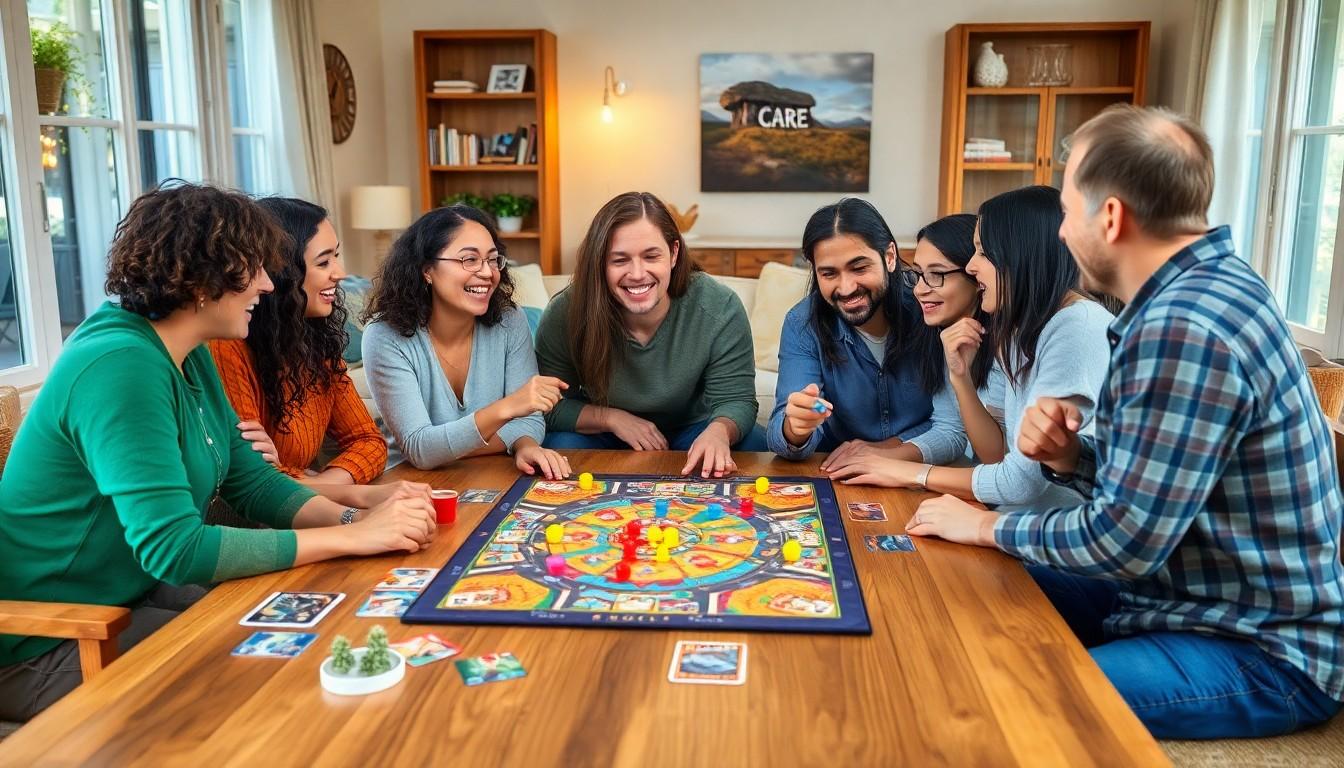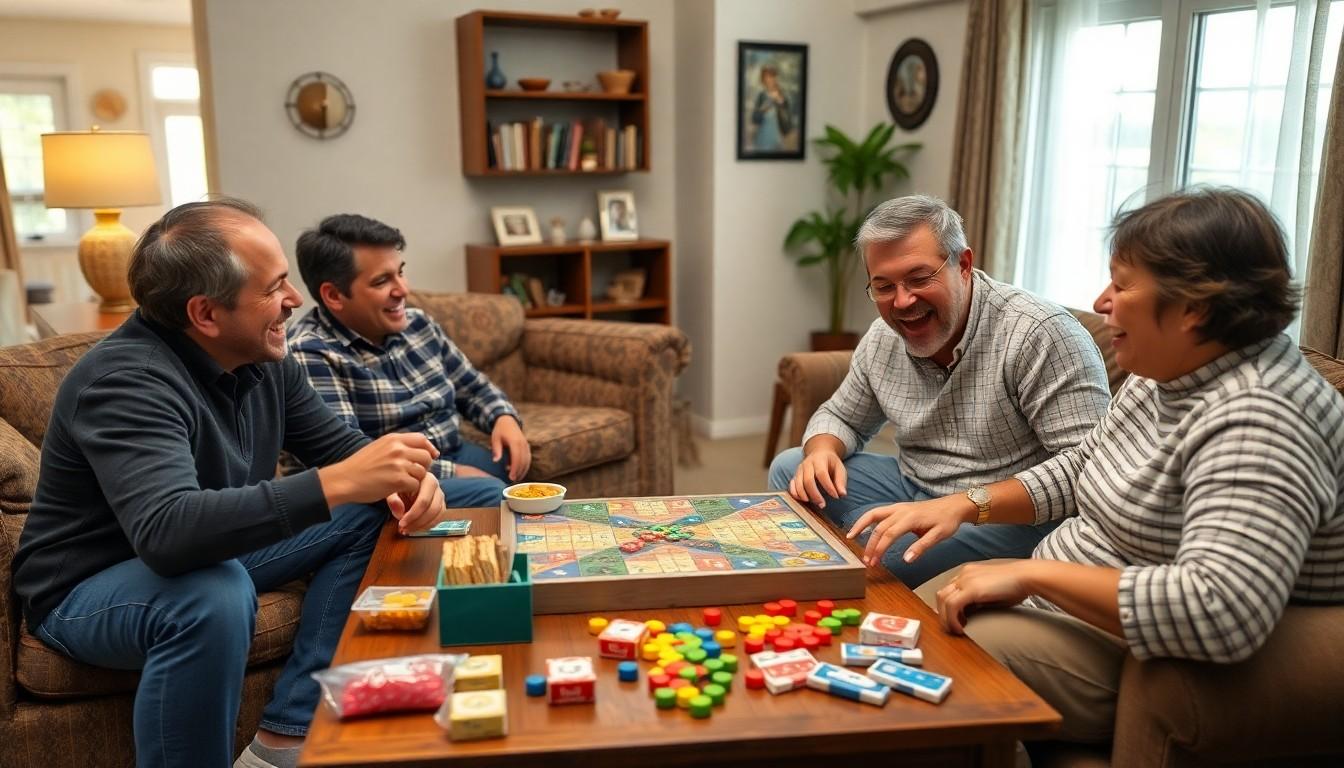In a world where families gather around screens for entertainment, competitive board games are making a triumphant return. They offer the perfect blend of strategy, laughter, and just the right amount of friendly rivalry. Picture this: a cozy living room filled with snacks, laughter, and a few playful insults as players battle it out for glory. Who knew that a simple cardboard box could unleash such fierce competition?
Competitive Board Games
Competitive board games offer players a thrilling mix of strategy and interaction. Players engage in mental challenges that test their critical thinking and decision-making skills. These games often involve direct competition where players aim to outsmart each other, creating an electric atmosphere.
A wide variety of competitive board games exist, ranging from classic titles to modern innovations. Strategic games like Chess and Settlers of Catan require deep planning, while party games such as Codenames and Dixit focus on social interaction and creativity. Each game type caters to different preferences, ensuring there’s something for everyone.
Many competitive board games encourage teamwork and collaboration, though they operate within the framework of rivalry. Players form alliances, negotiate deals, and can switch from cooperation to competition at any moment. This dynamic fosters engaging gameplay that keeps participants on their toes.
Research indicates that competitive board games enhance critical skills, including problem-solving and strategic thinking. Statistics show that playing these games promotes cognitive development in children and adults alike, making them valuable tools for learning and social bonding.
Various mechanics define competitive board games. Turn-taking, resource management, and real-time play represent common styles that contribute to gameplay diversity. Each mechanic influences player interaction and overall game strategy, establishing unique experiences in every gaming session.
Ultimately, competitive board games create memorable moments filled with laughter, tension, and friendly rivalry. While they provide entertainment, they also encourage social connections and intellectual growth, enriching the overall experience for all involved.
Types of Competitive Board Games

A diverse range of competitive board games exists, appealing to various interests and preferences. Each type brings unique elements to the table, creating distinct experiences for players.
Strategy Games
Strategy games emphasize critical thinking and planning. They challenge players to anticipate opponents’ moves while executing their own strategies. Popular titles include Chess, where tactical gameplay reigns supreme, and Settlers of Catan, fostering resource management. Players benefit from analyzing board positions and predicting outcomes. Engaging deeply in these titles hones cognitive skills, making them appealing for those who enjoy intense mental challenges.
Party Games
Party games focus on social interaction and laughter. Games like Codenames and Exploding Kittens encourage quick thinking and communication, ensuring everyone participates in the fun. Often featuring simple rules, these games accommodate larger groups, making them perfect for gatherings. They thrive on lighthearted competition, promoting friendly banter among friends. The emphasis on social dynamics enhances the overall experience, inviting players to engage in spirited exchanges.
Thematic Games
Thematic games immerse players in rich narratives and vibrant worlds. Titles such as Betrayal at House on the Hill and Gloomhaven attract those who crave storytelling within gameplay. These games often incorporate diverse scenarios and character development, increasing emotional investment. Many thematic games feature cooperative elements alongside competition, allowing for dynamic interactions. Players appreciate the depth and creativity present in these experiences, making them ideal for those drawn to immersive adventures.
Benefits of Playing Competitive Board Games
Competitive board games foster engaging environments where players interact and build connections. The blend of laughter and rivalry enhances shared experiences during gameplay.
Social Interaction
Players communicate and strategize throughout games, often sparking lively discussions. Friendships strengthen as participants navigate challenges together, sharing victories and defeats. Group dynamics shift, leading to new alliances and ongoing conversations even after the game ends. Competitive board games naturally break the ice, making them ideal for gatherings and celebrations. They encourage players to learn about each other’s perspectives while developing teamwork skills despite the backdrop of competition.
Cognitive Skills Development
Engaging with competitive board games enhances critical thinking and decision-making abilities. Players analyze opponents’ moves and predict outcomes, facilitating cognitive growth. Various games involve resource management, which requires strategic planning and foresight. Participants also practice problem-solving as they confront unexpected challenges during play. Research shows that these experiences promote cognitive flexibility, boosting mental agility. Both children and adults benefit from gameplay mechanics that emphasize skill development, ultimately enriching their intellectual repertoire.
Tips for Choosing the Right Competitive Board Game
Selecting an ideal competitive board game involves understanding the players and the level of challenge they seek. Certain factors make a game resonate more with a group.
Consider Player Preferences
Recognizing individual player preferences is crucial. Some players thrive on strategy, while others prefer light-hearted party games. Identifying interests ensures engagement. For instance, fans of deduction might enjoy games like Codenames, whereas enthusiasts of classic strategy could gravitate toward Chess. Evaluate group dynamics, too; larger groups benefit from games emphasizing teamwork. An understanding of these nuances shapes a more enjoyable experience.
Assess Game Complexity
Complexity level significantly influences game choice. Some players may enjoy multifaceted games requiring deep strategy, while others might prefer straightforward mechanics. Assessing familiarity with game types helps gauge comfort levels. For example, beginners may find simpler games like Uno more appealing. In contrast, seasoned players might seek challenges in games like Gloomhaven or Terraforming Mars. Thus, understanding the group’s skill level and patience for complex rules aids in selecting a fitting game.
Connection and Engagement
Competitive board games bring people together in a unique way that fosters connection and engagement. They challenge players to think critically while providing a platform for laughter and camaraderie. By choosing the right game based on preferences and skill levels, groups can create unforgettable moments filled with excitement.
The variety of game types ensures there’s something for everyone, whether it’s a strategic showdown or a lighthearted party game. As players navigate challenges and strategize against each other, they not only sharpen their cognitive skills but also strengthen their social bonds. Embracing the world of competitive board games can lead to countless enjoyable experiences, making them an essential addition to any gathering.








